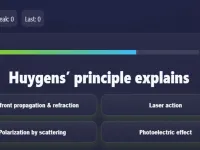Science games are an engaging way to learn about the fascinating world of scientific principles and concepts. These games combine education with entertainment, allowing players to explore complex topics like physics, chemistry, biology, and more in a fun and interactive manner. They can take various forms, including puzzles, simulations, quizzes, and even virtual experiments, catering to a wide range of interests and ages.
One of the key advantages of science games is their ability to simplify challenging concepts, making them accessible to everyone. By incorporating elements like storytelling and competition, these games motivate players to dive deeper into subjects they might find daunting. Moreover, many science games are designed to encourage critical thinking and problem-solving skills, which are essential in both academic and real-world contexts.
Whether played individually or in groups, science games provide an immersive experience that enhances learning retention. Their interactive nature keeps players engaged, fostering a sense of curiosity and wonder about the natural world. As technology advances, the variety of available science games continues to grow, offering endless opportunities for exploration and discovery.
Players are drawn to science games for several compelling reasons. First and foremost, they uniquely blend fun and education, allowing players to learn while they play. This combination is particularly appealing for those who might find traditional learning methods tedious or challenging. The thrill that comes from mastering a scientific concept or completing a challenging game level provides a satisfying sense of achievement.
Additionally, science games cater to a variety of learning styles. Visual learners can benefit from simulations and graphics, while auditory learners may enjoy games with engaging narratives or sound effects. This diversity means that more players can find a format that resonates with them personally, enhancing their overall gaming experience.
Furthermore, the competitive aspect of many science games adds an exciting dimension. Players often enjoy challenging their friends or competing against others online, creating a community of science enthusiasts. This sense of camaraderie not only makes the learning process more enjoyable but also helps reinforce concepts as they discuss and share their knowledge with peers. Ultimately, players love science games because they are both enjoyable and fulfilling, making learning a natural part of the gaming experience.
There are numerous exciting science games available for players seeking to combine fun with learning. Some popular titles include FRAGMENT, which challenges players with intriguing puzzles that promote scientific thinking. Another great option is Monster Truck Dirt Rally, a fun yet educational game that incorporates engineering concepts within its gameplay. For those interested in flight and aviation, jet Games provide thrilling experiences that explore aerodynamics and physics through interactive challenges.
These titles represent just a fraction of the rich variety available within the science game genre. Whether through puzzles, engaging narratives, or competitive challenges, players can discover an array of games that make learning about science an exciting adventure!

